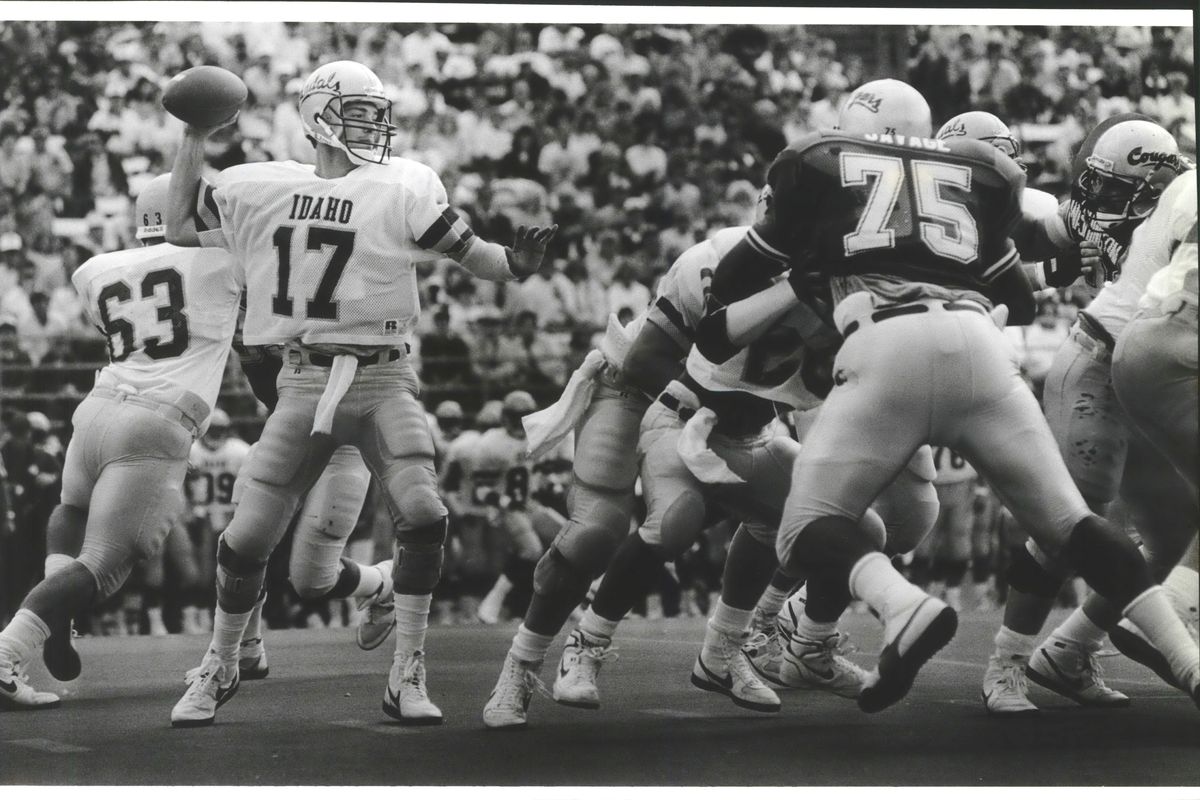‘There wasn’t any throw he couldn’t make’: Idaho’s John Friesz among star-studded inaugural Big Sky Hall of Fame class

Playing in the NFL was all well and good for John Friesz, but memories from the years he played college football at Idaho are the ones the quarterback cherishes the most.
“It was a group of guys who had no other motive than to have a good time and win football games and do difficult things together,” Friesz said this week. “It was a time when it was just fun. We had so much fun here.”
Friesz, who led the Vandals to three consecutive Division I-AA playoff appearances from 1987 to 1989 and was first Big Sky player to win the Walter Payton Award, is one of 14 athletes who will be recognized as inaugural members of the conference’s Hall of Fame during a banquet Saturday night at the Davenport in downtown Spokane.
The event was first scheduled for March 14, 2020, in Boise, but that was postponed in the early stages of the COVID-19 pandemic.
Other members of the class include football players Jared Allen (Idaho State), Dave Dickenson (Montana) and Jan Stenerud (Montana State); women’s basketball player Shannon (Cate) Schweyen from Montana; men’s basketball player Damian Lillard (Weber State); and women’s basketball coach Robin Selvig (Montana).
Two of the conference’s most notable administrators are also among the inductees, including Milton “Dubby” Holt from Idaho State, and Jack Friel, who became the Big Sky’s first commissioner in 1963 after coaching Washington State’s men’s basketball team for 30 years.
Rounding out the class are track and field stars Angela Chalmers and Lopez Lomong from Northern Arizona, Ellie (Rudy) Vanswearingen from Montana State, Stacy Dragila (Idaho State), and the Lumberjacks’ long-time cross country and track and field coach Ron Mann.
For Friesz, the honor follows earlier recognitions: Idaho retired his No. 17 in 2006, the same year he was inducted into the College Football Hall of Fame.
Friesz said he supposes that a big reason he gets recognized is because of his statistics. In 35 games at Idaho he threw for 10,697 yards, which, on a yards-per-game basis (305.6) still ranks among the top five all-time in the Big Sky.
“It was one of the first things we would talk about after the game, and it wasn’t me: It was the linemen,” Friesz said. “They would find the (sports information director) and say, did we do it? Did we throw for 300 (yards)? It was a big deal for them, and I was just along for the ride.”
Friesz was named the Big Sky Offensive Player of the Year in 1987, 1988 and 1989 and after his time at Idaho played 10 seasons in the NFL.
Keith Gilbertson, who was Idaho’s head coach from 1986 to 1988 and later coached at Washington, Cal and in the NFL, said Friesz was “one of the most gifted throwers I’ve ever seen.”
“There wasn’t any throw he couldn’t make,” Gilbertson said. “He was blessed with a wonderful throwing motion and a great arm … and then he could process things. He was a smart, bright guy.”
When the inaugural class was announced in December 2019, the Big Sky also released its criteria for selection going forward: athletes must have participated in two full seasons of competition and “should have made outstanding contributions or offered extraordinary service to athletics at the institutional, conference and national level.” Additionally, they are eligible any time beginning five years after their collegiate careers.
Coaches who have made similar contributions are also eligible for Hall of Fame recognition after service of three full years, and they also must have completed their coaching tenures or have been out of the conference for at least five years.
Administrators are immediately eligible after serving three full years in the conference.
Future classes will be limited to no more than eight student-athletes, and no more than one member of each annual class will represent any current member institution.
Six track and field athletes, coaches recognized
Among the 14 inaugural members, no sport is recognized more than track and field, from which the Big Sky’s 15-person committed selected six athletes and coaches.
Holt, recognized both for his contributions as an administrator and a coach, was Idaho State’s athletic director and track and field coach, leading the Bengals to 13 track and field conference titles between 1963 and 1979.
Dave Nielsen, who was an assistant coach at Eastern Washington the past five years before his retirement this spring, was Idaho State’s track and field coach for 31 years before that. He knew Holt up until his death in 2007, and Nielsen also coached Dragila, another inductee, when she was at Idaho State from 1993 to 1996.
“There are people that all of a sudden came through and established themselves in the top echelon of track and field in this little Division I conference,” Nielsen said. “What a deal. It’s part of the unique flavor of the Big Sky Conference that you create an opening and good things happen.”
Among her many career recognitions, Dragila won the gold medal at the inaugural women’s pole vault at the 2000 Sydney Olympics.
Chalmers, who was a six-time All-America selection from 1982 to 1987, competed in the 1988 and 1992 Olympics for Canada, winning bronze in the 3,000 meters in 1992.
Ellie Rudy twice won pole vault, in 2007 and 2008, at the NCAA Indoor Track and Field Championships representing Montana State.
Lomong became a two-time Olympian after his career at NAU (from 2005 to 2007), where he competed in track and cross country. He holds the Big Sky’s outdoor records in the 800 and 1,500.
Mann was the NAU director of cross country and track and field from 1980 to 2004. In 1998 NAU became the first school in conference history to win all four cross country conference titles (men, women, team and individual) in the same season.